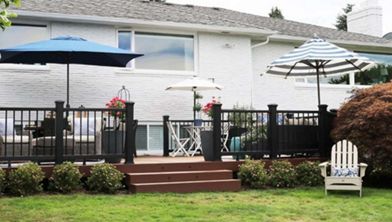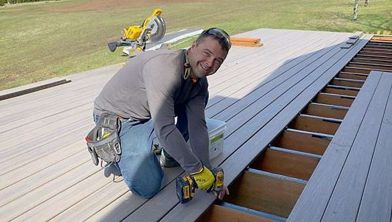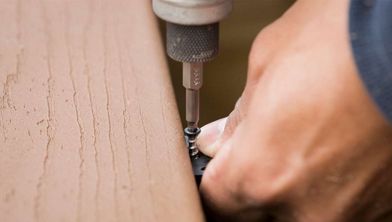How Many Deck Boards Do I Need?
Learn how to calculate the number of deck boards you will need to create your dream deck, small or large, with the experts at Trex.
If you’re planning to build or resurface a deck, one of the questions you will need to answer is, "How many deck boards do I need?" The number of deck boards needed for your project can vary for a variety of reasons, including the type of decking material you choose, the size of your deck and more. Determining the number of deck boards helps inform the cost for your project. Follow along to learn how to calculate the number of deck boards you need for your next decking project.
Steps to Calculate Deck Boards Needed
Let's get started with these eight easy steps.
Step 1: Determine the Square Footage of the Deck
Calculate the overall length and width of your deck design. Take into account any extra angles, nooks, crannies and staircases in your calculations. Grab a buddy and use a 25-foot tape measure to give substance to your vision. Take great notes, and even make a design sketch, if you haven’t already, to see how your measurements will pan out.
Step 2: Showcase the Shape of the Deck
Not all decks are squares or rectangles. You can choose a hexagon, pentagon, octagon, or whatever shape you like within the space you have. Take a look at our free deck plans to see some of our most popular deck shapes. Can’t find one that you are in love with? You can customise each of our deck plans or start from scratch with our Deck Designer tool.
Step 3: Figure Out the Square Footage of Each Board
Trex composite deck boards are manufactured in three widths. The 1” Transcend® and Enhance® boards are .94” x 5.5” and the 1” Select® boards are .82” x 5.5”. Transcend and Select boards also are available in a 2x6 dimension, or 1.3” x 5.5”. All three decking collections come in square-edge and grooved-edge. Grooved-edge boards allow you to use the Trex Hidden Fastener for a cleaner surface appearance.
Step 4: Understand the Length of Each Board
The lengths of the decking boards usually range from 8’ to 20’. Trex boards come in 12’, 16’ and 20’ lengths. You’ll also need to know the length of each board to calculate the overall size of your deck.
You'll need a saw to cut composite deck boards as you assemble your deck properly. Some boards will need to be cut at an angle to make them fit together correctly. Always leave room for extra boards, too, for the waste on the project after cutting them to the right angles and lengths.
Step 5: Calculate the Number of Deck Boards
Anticipate having waste on your decking project. The general rule of thumb is that you need 5% extra decking material to account for waste and mistakes. For example, if your project calls for 80 boards for 800 square feet, add another 40 square feet for waste, or four extra boards.
To determine the number of deck boards you need to build your deck:
- Take the area of your deck (as shown in Step 1) and divide that number by the board area (Step 3).
- Deck Depth (in inches) / Board Width (inches) = Number of deck boards needed.
- 0.05 x Number of deck boards needed = Total # of extra deck boards you should purchase
- Total number of deck boards needed + Total number of extra deck boards = # of boards you should order
Let’s work through an example. Imagine we want to build a 20’x12’ deck using a deck board that is 5.5 inches wide and 20” in length.
- First, calculate the depth in inches: 12x12 = 144 inches
- Next, divide the board depth (in inches) by the board width (For most 1x6 or 2x6 boards, the width is 5.5”): 144/5.5= 26.18
- Then, round up to get a whole number: 27 boards
- Next, multiply the total number of deck boards needed by 0.05 to account for the additional 5% of material needed for waste. Again, round up to get a whole number 0.05 x 27 = 2 extra boards
- Lastly, add the waste boards to the total. 27 + 2 = 29 boards total
Your actual results will vary depending on the size and shape of your deck.
Step 6: Use a Specialised Deck Cost Calculator
If those calculations seem a bit too much, skip the whole process. Use the Trex Cost Calculator to determine an estimated material cost for your project. The easy-to-use calculator factors in additional materials like a wood substructure and deck railing.
What to Watch Out for When Calculating the Number of Deck Boards for Your Deck
A deck is a big investment, one that you can enjoy for a lifetime. Rather than skimp when you’re in the planning phase, how about dreaming big? What do you really want out of your deck? Here are a few items to consider when planning your dream outdoor space.
Non-Standard Deck Shapes
You can make your deck any size or shape based on your needs and budget. The shape and space requirements impact how you use the deck board calculator. For example, a simple square or rectangular deck requires a fairly straightforward calculation. Non-standard designs require a bit more calculation but it’s not insurmountable.
If dreaming big is part of the plan, the cost calculator can handle it. You can easily design a deck that meets your needs while letting your guests spread out and enjoy themselves. Rather than cram your grill into the seating area, design a rectangular or hexagonal space off to one side of your deck to serve as the cooking area. That way, no one is trying to move around you as you're attempting to cook.
Double Decking
Perhaps you want a multi-level deck. You'll need to calculate the deck boards for two levels rather than one. Calculate each level separately. Keep in mind the extra supports you need to account for so your multi-level deck is stable and well-built. Also, remember safety measures and railings as required by code.
Joists, Support Beams, and Stairs
When looking to price out the more advanced pieces of your decking project, like the substructure and stairs, we recommend using the Trex Deck Designer tool. This tool accounts for the joists and support beams that hold everything together. It can also indicate how many fasteners and joist hardware pieces to purchase to ensure a smooth build.
Stairs can be tricky to price out because local codes may differ on the width and spacing of the stairs. If you want to make your deck easier for guests who might have mobility issues, you may want to consider adding an ADA-compliant handrail system or ramp. Keep in mind, more complex designs like multi-level decks, ramps and stairs will require more framing materials and will greatly impact the price of your deck.
How Many Deck Boards Do I Need for a 12’x12’ Deck?
A 12’x12’ deck is a typical size for a modest backyard structure. How many decking boards you need for a deck this size will vary depending on the Trex decking line you choose. We have calculated the number of deck boards needed for some of the most common deck board lengths.
For 2 x 6s, you'll need:
- 27 12-foot boards
- 21 16-foot boards
- 17 20-foot boards
These figures take into account waste from cutting the boards to their proper lengths. Now that you know the number of boards, you can contact your local Trex retailer to purchase the deck boards you need. Prices may vary based on your location as well as supply and demand.
Learn More About the Cost of Deck Boards
We hope our guide on calculating deck boards will make planning your deck project easier and smoother. You can jumpstart your deck construction project with our handy deck designer and decking calculator tools. Feel free to review our deck how-to articles for some inspiration as you dream about your backyard paradise.
Shop the Trex® Decking Collection at a retailer near you.
This content was partially or fully generated by AI and has been reviewed by our team to ensure accuracy and relevance.




































